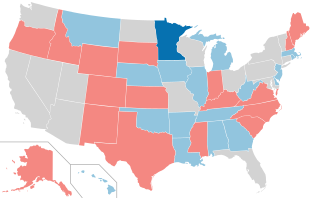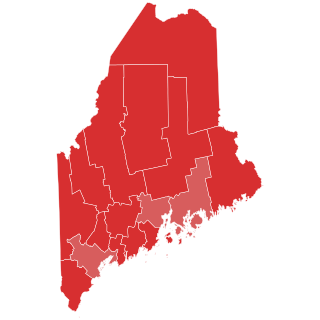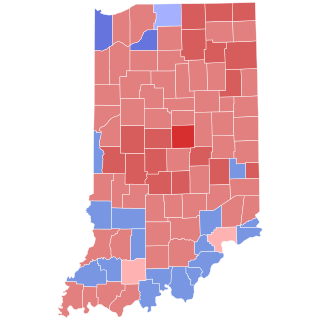
The 1996 United States presidential election was the 53rd quadrennial presidential election, held on Tuesday, November 5, 1996. Incumbent Democratic President Bill Clinton defeated former Senate Majority Leader Bob Dole, the Republican nominee, and Ross Perot, the Reform Party nominee and 1992 Independent presidential candidate.

Richard Green Lugar KBE was an American politician who served as a United States Senator from Indiana from 1977 to 2013. He was a member of the Republican Party.

The 2000 United States Senate elections were held on November 7, 2000. The elections coincided with other federal and state elections, including the presidential election which was won by Republican George W. Bush. These elections took place six years after Republicans had won a net gain of eight seats in Senate Class 1. Despite George W. Bush's victory in the presidential election, the GOP lost 4 senate seats, the most a winning president's party has lost since the passage of the 17th amendment. This election marked the first election year since 1990 where Democrats made net gains in the Senate. Democrats defeated incumbent Republicans in Delaware, Michigan, Minnesota, Missouri, and Washington, and they won an open seat in Florida. In Missouri, the winner was elected posthumously. The Republicans defeated a Democratic incumbent in Virginia, and won an open seat in Nevada. Additionally, a Republican in Georgia died earlier in the year and a Democrat was appointed to replace him, who then went on to win the special election.

The 1998 United States Senate elections were held on November 3, with the 34 seats of Class 3 contested in regular elections. This was seen as an even contest between the Republican Party and Democratic Party. While the Democrats had to defend more seats up for election, Republican attacks on the morality of President Bill Clinton failed to connect with voters and anticipated Republican gains did not materialize. The Republicans picked up open seats in Ohio and Kentucky and narrowly defeated Democratic incumbent Carol Moseley Braun, but these were cancelled out by the Democrats' gain of an open seat in Indiana and defeats of Republican Senators Al D'Amato and Lauch Faircloth. The balance of the Senate remained unchanged at 55–45 in favor of the Republicans.

The 1996 United States Senate elections were held on November 5, with the 33 seats of Class 2 contested in regular elections. Special elections were also held to fill vacancies. They coincided with the presidential election of the same year, in which Democrat Bill Clinton was re-elected president.

The 1990 United States Senate elections were held on Tuesday, November 6, 1990, with the 33 seats of Class 2 contested in regular elections. Special elections were also held to fill vacancies. The Democratic Party increased its majority with a net gain of one seat from the Republican Party. The election cycle took place in the middle of President George H. W. Bush's term, and, as with most other midterm elections, the party not holding the presidency gained seats in Congress. Until 2022, this had been the only election cycle where only one U.S. Senate seat flipped parties.

The 1988 United States Senate elections were elections for the United States Senate. Held on November 8, the 33 seats of Class 1 were contested in regular elections. In spite of the Republican victory by George H. W. Bush in the presidential election, the Democrats gained a net of one seat in the Senate. Seven seats changed parties, with four incumbents being defeated. The Democratic majority in the Senate increased by one to 55–to–45.

The 1986 United States Senate elections were elections for the United States Senate. Held on November 4, in the middle of Ronald Reagan's second presidential term, the 34 seats of Class 3 were contested in regular elections. The Republicans had to defend an unusually large number of freshman Senate incumbents who had been elected on President Ronald Reagan's coattails in 1980. Democrats won a net of eight seats, defeating seven freshman incumbents, picking up two Republican-held open seats, and regaining control of the Senate for the first time since January 1981. This remains the most recent midterm election cycle in which the sitting president's party suffered net losses while still flipping a Senate seat.

The 1984 United States Senate elections were held on November 6, with the 33 seats of Class 2 contested in regular elections. They coincided with the landslide re-election of President Ronald Reagan in the presidential election. In spite of the lopsided presidential race, Reagan's Republican Party suffered a net loss of two Senate seats to the Democrats, although it retained control of the Senate with a reduced 53–47 majority. Democrats defeated incumbents in Illinois and Iowa, and won an open seat in Tennessee, while Republicans defeated an incumbent in Kentucky.

The 1982 United States Senate elections were held on November 2, 1982. They were elections for the United States Senate following Republican gains in 1980. The 33 Senate seats of Class 1 were up for election in 1982. A total of four seats changed hands between parties, with Democrats winning seats in New Jersey and New Mexico, and Republicans taking seats in Nevada and the seat of the lone independent, Senator Harry Byrd Jr., in Virginia. Democrats made a net gain of one seat bringing them to 46 seats, while Republicans stayed at 54 seats for a majority. However, the Democratic gain in New Jersey replaced a Republican that had been appointed earlier in the year.

The 1976 United States Senate elections was an election for the United States Senate. Held on November 2, the 33 seats of Class 1 were contested in regular elections. They coincided with Democrat Jimmy Carter's presidential election and the United States Bicentennial celebration. Although almost half of the seats decided in this election changed parties, Carter's narrow victory did not provide coattails for the Democratic Party. Each party flipped seven Senate seats, although, one of the seats flipped by Democrats was previously held by a Conservative.

The 1974 United States Senate elections were held on November 5, with the 34 seats of Class 3 contested in regular elections. They occurred in the wake of the Watergate scandal, Richard M. Nixon's resignation from the presidency, and Gerald Ford's subsequent pardon of Nixon. Economic issues, specifically inflation and stagnation, were also a factor that contributed to Republican losses. As an immediate result of the November 1974 elections, Democrats made a net gain of three seats from the Republicans, as they defeated Republican incumbents in Colorado and Kentucky and picked up open seats in Florida and Vermont, while Republicans won the open seat in Nevada. Following the elections, at the beginning of the 94th U.S. Congress, the Democratic caucus controlled 60 seats, and the Republican caucus controlled 38 seats.

The 2006 United States Senate election in Maine was held November 7, 2006. Incumbent Republican Olympia Snowe won re-election to a third term. As of 2023, this was the last time Republicans won the Class 1 U.S. Senate seat in Maine.

The 2006 United States Senate election in Indiana was held November 7, 2006. Incumbent Republican United States Senator Richard Lugar was re-elected to his sixth six-year term with 87.3% of the vote. He did not have a Democratic opponent and only faced opposition from a Libertarian candidate; this was the only U.S. Senate race in 2006 in which Democrats did not field a candidate. This would be the last successful race of Lugar's decades long political career. This is also the last time that Lake, Marion, and Monroe counties have voted for a Republican candidate for Senate.

The 2012 United States Senate elections were held on November 6, 2012, with 33 of the 100 seats in the Senate, all Class 1 seats, being contested in regular elections whose winners would serve six-year terms beginning January 3, 2013, with the 113th Congress. Democrats had 21 seats up for election, plus 1 Independent and 1 Independent Democrat, while the Republicans had only 10 seats up for election. The presidential election, elections to the House of Representatives, elections for governors in 14 states and territories, and many state and local elections were also held on the same day.

The 2002 United States Senate election in Alabama was held on November 5, 2002. Incumbent Republican U.S. Senator Jeff Sessions won re-election to a second term. Sessions became the first Republican to be elected to two full terms to the Senate from the state. As of 2022, this is the most recent Senate election in Alabama in which Colbert and Lawrence counties voted for the Democratic candidate.

The 2000 United States Senate election in Indiana was held on November 7, 2000. Incumbent Republican U.S. Senator Richard Lugar was re-elected to his fifth six-year term.

The 1994 United States Senate election in Indiana was held November 8, 1994. Incumbent Republican U.S. Senator Richard Lugar was re-elected to a fourth term. Lugar won all but one county.

The 2012 United States Senate election in Indiana took place on November 6, 2012, concurrently with the U.S. presidential election as well as other elections to the United States Senate and House of Representatives and various state and local elections.

The 1982 United States Senate election in Indiana was held on November 2, 1982. Incumbent Republican United States Senator Richard Lugar faced Democratic United States Representative Floyd Fithian in the general election. Lugar won with a margin of 53% of the vote, compared to Fithian's 46%. This was Lugar's closest election out of his 6 senate elections for the class 1 seat.





















